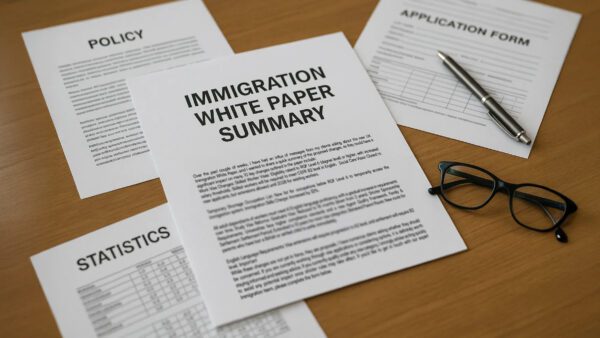The UK’s immigration system is among the most intricate legal frameworks in the world, with the Home Office adjudicating thousands of visa and settlement applications annually. While many are granted, a substantial proportion are refused- sometimes even erroneously or unfairly. In 2022, over 50% of immigration judicial review claims that proceeded to a substantive hearing were either successful or settled in favour of the applicant. This statistic underscores the fallibility of the Home Office decision-making and the crucial role of Judicial Review (JR) in ensuring that administrative actions adhere to principles of legality, rationality, and procedural fairness.
For individuals, families, and businesses adversely affected by flawed Home Office decisions, Judicial Review can be a powerful legal remedy. However, it is not an appeal and does not re-evaluate the merits of an immigration application. Instead, it scrutinises the decision-making process to determine whether it was lawful, reasonable, and procedurally sound.
At Quastels, we have successfully represented clients in challenging Home Office decisions through Judicial Review, securing rightful reconsideration and redress for those treated unfairly under the immigration system.
What is Judicial Review?
Judicial Review is a mechanism by through which the courts assess whether a public authority, such as the Home Office, has acted within the bounds of the law. Unlike an appeal, which examines whether a decision was correct in substance, JR focuses on whether the decision was made in a legally permissible manner. The grounds for Judicial Review typically include:
- Illegality– Where the Home Office has acted beyond its statutory powers or misapplied the law.
- Irrationality (Wednesbury Unreasonableness)– Where a decision is so unreasonable that no rational authority could have arrived at it.
- Procedural Impropriety– Where the decision-making process was fundamentally flawed, for example, through failure to consider relevant evidence or to provide the applicant with an opportunity to respond.
When is Judicial Review Necessary?
Judicial Review is particularly relevant in cases where no statutory right of appeal exists or where all other legal avenues have been exhausted. It may be appropriate in instances such as:
- Visa refusals with no right of appeal or administrative review.
- Unlawful delays- when the Home Office has failed to make a decision within a reasonable timeframe.
- Deportation and removal orders that lack a sound legal basis.
- Indefinite Leave to Remain (ILR) refusals based on erroneous grounds.
- Unjust revocation of sponsor licences, adversely affecting businesses and skilled migrant employees.
Case Law: A Landmark Precedent in Immigration Judicial Review
A seminal case in this area is R (Balajigari) v Secretary of State for the Home Department [2019] EWCA Civ 673, where the Court of Appeal ruled that the Home Office had acted unlawfully by refusing visa applications on grounds of alleged dishonesty without affording applicants an opportunity to respond. The ruling reinforced a fundamental legal principle: decisions affecting immigration status must be procedurally fair, particularly when adverse findings could have severe consequences for applicants. This case illustrates the vital role of Judicial Review in holding the Home Office accountable.
The Judicial Review Process: A Step-by-Step Guide
- Pre-Action Protocol (PAP) Letter
- Before initiating formal proceedings, the applicant must submit a Pre-Action Protocol (PAP) letter to the Home Office.
- This letter outlines the grounds for challenge and requests reconsideration.
- The Home Office has 14 days to respond, potentially resolving the issue without litigation.
- Issuing Judicial Review Proceedings
- If the Home Office refuses to reconsider or fails to respond, a Judicial Review application is lodged with the Upper Tribunal (Immigration and Asylum Chamber) or the Administrative Court (High Court), depending on the nature of the case.
- Permission Stage
- The court conducts an initial assessment to determine whether the claim has sufficient legal merit.
- If permission is refused, the applicant may request an oral hearing to argue their case in person.
- Substantive Hearing
- If permission is granted, a full hearing is conducted before a judge.
- The court examines whether the Home Office’s decision was lawful and procedurally sound.
- If the challenge is successful, the court may quash (invalidate) the decision and order the Home Office to reconsider it in accordance with the law.
- Potential Remedies
- The court does not grant immigration status directly but compels the Home Office to reassess the case lawfully.
- In some cases, costs may be awarded if the court finds the Home Office acted unlawfully.
Critical Considerations Before Pursuing Judicial Review
- Time Sensitivity
- JR applications must be lodged promptly, and no later than three months from the date of the impugned decision.
- For urgent cases—such as imminent removal orders—applications must be made immediately, often accompanied by an injunction request.
- Strength of Legal Grounds
- Judicial Review is not an opportunity to present new evidence or re-argue an immigration application. It is strictly a procedural challenge based on whether the decision was legally flawed.
- Costs and Litigation Risks
- udicial Review can be costly, and unsuccessful applicants may be ordered to pay the Home Office’s legal costs.
- However, where the challenge is well-founded, a successful outcome can overturn an unjust decision and provide a path to securing immigration status.
Exploring Alternative Remedies
Before pursuing Judicial Review, applicants should explore whether alternative legal remedies are available:
- Administrative Review – Certain refusals (e.g., Skilled Worker visa rejections) can be reconsidered internally by the Home Office through an administrative review, which may be a quicker and less costly alternative.
- Reapplication – In some cases, submitting a fresh application with stronger supporting evidence may be more effective than litigation.
How Quastels Can Assist
At Quastels, we are acutely aware that Home Office decisions can have profound consequences for individuals, families, and businesses. Our specialist immigration team offers:
- Strategic legal advice on whether Judicial Review is the appropriate course of action.
- Meticulous drafting of Pre-Action Protocol letters, often leading to resolution without litigation.
- Expert representation in the Upper Tribunal and Administrative Court.
- Urgent injunction applications in deportation and removal cases.
We are committed to ensuring that our clients receive fair and lawful treatment under the immigration system. If you have been subject to an unjust Home Office decision, it is imperative to act swiftly.
Contact Quastels today to discuss your case and explore your legal options.









